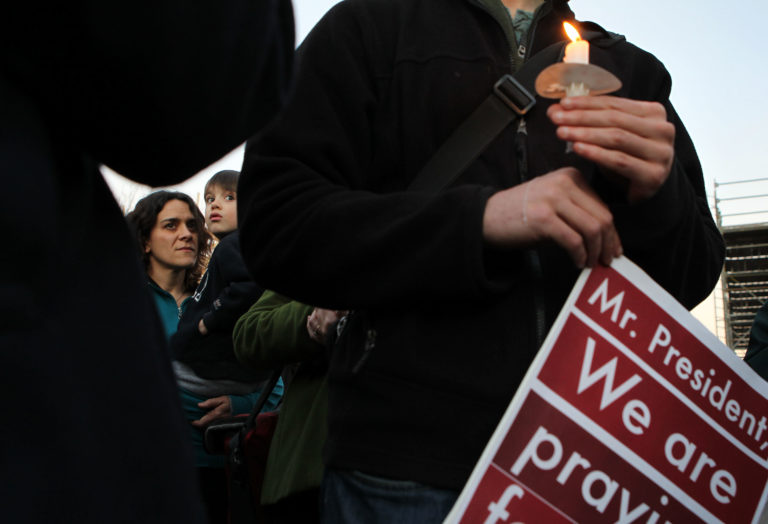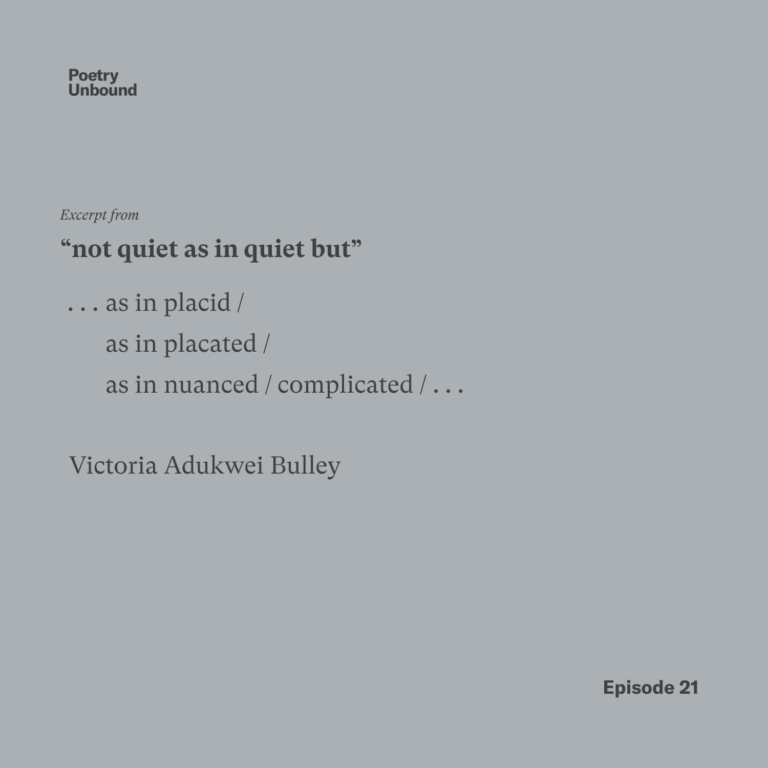
A local resident and her son participate in a candlelight vigil outside the White House for the victims of the Sandy Hook shooting on December 14, 2012. Image by Alex Wong/Getty Images, © All Rights Reserved.
What Are We Willing to Feel?
In prenatal yoga classes, it is not uncommon for a teacher to ask you to get into some uncomfortable position and encourage you to hold it — an experiment in relating to your own physical discomfort. The idea is that as your birth approaches, you need to have some practice surrendering to pain. In my class on Monday, as I was sitting on my heels, my toes curled under and stinging, my teacher Rosy said,
“The question is: what are you willing to feel?”
It struck me right in my very bulbous gut. Not about birth, but about death. About the carnage that has been created in this country.
At least four regular customers of Pulse, the lesbian, gay, bisexual, and transgender nightclub where the massacre took place, told reporters that they believed they had seen the gunman, Omar Mateen, there before (some said up to a dozen times). Investigators are looking at reports that Mateen was also using gay dating apps.
Which leads me to wonder, what was Mateen willing to feel?
How many hatreds bloom from a seed of self-loathing? And how many of those blooms become incomprehensible violence?
I have often prayed that I might be more gentle with myself, with the parts of me that I find weak, boring, messy, inadequate, ugly. As I’ve tried to wrap my head and heart around what Mateen did, I’ve come to wonder if these prayers are even more significant than I’ve ever given them credit for — not a matter of “self-care,” but, taken to their most extreme lengths, a matter of collective care, of life and death even.
It doesn’t matter whether he was gay or not. It matters that perhaps part of what made him capable of such a horrifically violent act against others was an intolerance for what he saw mirrored in himself. And, of course, we have seen this in so many other moments of violence — the trail of proverbial breadcrumbs leading back to some irreconcilable self-hatred in the killer.
What was this man, Mateen, who was once a boy, Omar, taught about his own feelings? How was he taught to relate to the most challenging of them? What did he watch other adults, other men in particular, do with their incongruous, messy, complex feelings? With their self-loathing? With their impulses to make it all make sense? With their craving for the clean purity, however delusional, of superiority and righteousness?
But it’s not just Mateen’s feeling that I am wondering about.
Mateen bought his guns at the St. Lucie Shooting Center. Owner Ed Henson said that the shooting was horrific and, of Mateen,
“He’s evil. We happen to be the gun store he picked.”
Evil is no less a delusion than purity. We reach for it in moments when we can’t bear to comprehend that what exists in Mateen may also, on some level, exist in us. We rationalize. If he’s evil, then he’s a different animal completely. If he’s evil, then our own culpability is erased. If he’s evil, then we can lament the presence of mutations in our human family, and in so doing, essentially accept their inevitability. We are off the hook.
What is Henson willing to feel?
Is he willing to entertain the fact that he, by selling those guns, by owning a gun shop, is part of a system that set Mateen up to murder? Is he willing to feel his responsibility?
What about Max Baucus, Mark Begich, Heidi Heitkamp, Mark Pryor, Lamar Alexander, Kelly Ayotte, John Barrasso, Roy Blunt, John Boozman, Richard Burr, Saxby Chambliss, Dan Coats, Tom Coburn, Thad Cochran, Bob Corker, John Cornyn, Mike Crapo, Ted Cruz, Michael Enzi, Deb Fischer, Jeff Flake, Lindsey Graham, Chuck Grassley, Orrin Hatch, Dean Heller, John Hoeven, Jim Inhofe, Johnny Isakson, Mike Johanns, Ron Johnson, Mike Lee, Mitch McConnell, Jerry Moran, Lisa Murkowski, Rand Paul, Rob Portman, James Risch, Pat Roberts, Marco Rubio, Timothy Scott, Jeff Sessions, Richard Shelby, John Thune, David Vitter, Roger Wicker?
Are these political leaders — our senators who blocked background check legislation — willing to feel their responsibility in this and future massacres?
Mateen reportedly beat his ex-wife, Sitora Yusufiy, and at one point held her hostage. She divorced him after only four months of marriage, citing his mental health issues. Studies show that over half of the 110 mass shootings in the United States between January 2009 & July 2014 include murder of current or former spouse, intimate partner, or family member. A felony domestic violence conviction is the single greatest predictor of future violent crime among men. And yet, in 35 states, those convicted of misdemeanor domestic violence crimes or those who have restraining orders can buy and carry guns.
Are the legislators in those 35 states willing to feel the weight of their own wildly illogical and recklessly dangerous policy?
And finally, what are we, what am I, willing to feel?
I’ve been trying to answer that question for myself this week. First, am I willing to feel the depth of my own sadness about this? Crying in the supermarket. Looking at my growing belly and feeling so conflicted about welcoming a new baby into this particular world, one where Mateen was shaped. Listening to Anderson Cooper read these names, show these selfies, describe these human beings. Imagining them dancing, losing track of time and self-consciousness, sweat surfacing on their skin, love in the music, in the air, in between them.
And after I’ve felt my sadness, or maybe as I’m feeling my sadness, am I willing to feel my own responsibility, and in partnership, my own power? Am I willing to acknowledge the importance of my own capacity to feel my most complex feelings, to nurture this in my male partner and friends, to raise my daughters to feel theirs? As Pamela Shifman and Salamishah Tillet so poignantly wrote,
“Safe and democratic families are the key to ensuring safe and democratic communities.”
Am I willing to show up as an ally to my queer community, who can marry just like me, but can in no way, shape, or form enjoy the relative safety I enjoy? Am I willing to believe in the worth of fighting for gun legislation at a time when it is much easier to believe that government is too broken to yield?
And, really, as I ask these questions, I already know the answer. I have no other choice. We have no other choice. Like birth, which is coming whether I welcome it or not, I must surrender to the burden and blessing of being a person awake and feeling in a violent world capable of change.

